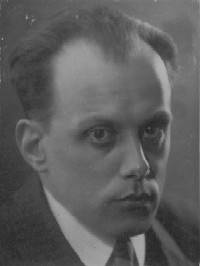- Vladimir Bartol
Infobox Writer
name = Vladimir Bartol

caption =
birth_date = birth date|1903|2|24|mf=y
birth_place =Trieste ,Austria-Hungary (now inItaly )
death_date = death date|1967|9|12|mf=y
death_place =Ljubljana ,Socialist Federal Republic of Yugoslavia (now inSlovenia )
occupation = Writer
genre =
movement =
magnum_opus =
influences =Nietzsche ,Klement Jug ,Sigmund Freud ,Carl Jung ,Dostojevski ,Josip Vidmar ,Anton Novačan
influenced =Dušan Jelinčič ,Igor Škamperle
website =
footnotes =Vladimir Bartol (
february 24 1903 –september 12 1967 ) was a Slovenianwriter , most famous for his novel "Alamut". Alamut was published in 1938 and translated into numerous languages, becoming the most popular work ofSlovene literature around the world.Biography
Bartol was born on
February 24 ,1903 in the village of Sveti Ivan ("San Giovanni" in Italian), now a suburb ofTrieste (then part of theAustro-Hungarian Empire ), as the third child out of seven to Gregor Bartol, a post office clerk, andMarica Bartol Nadlišek , a teacher, editor and femminist author. His parents offered their children extensive education. His mother introduced him topainting , his father tobiology . In his autobiographical short stories, Bartol described himself as an oversensitive and slightly odd child with a rich fantasy life. He was interested in many things: biology andphilosophy ,psychology ,art , and of coursetheatre andliterature . As a scientist, he collected and researched butterflies.Vladimir Bartol began his elementary and secondary schooling in
Trieste and concluded it inLjubljana , where he enrolled at theUniversity of Ljubljana to study biology and philosophy. In Ljubljana, he met the young Slovene philosopherKlement Jug who introduced him to the works ofFriedrich Nietzsche . Bartol also gave special attention to the works ofSigmund Freud . He graduated in 1925 and continued his studies at Sorbonne inParis (1926–1927), for which he obtained a scholarship. In 1928 he served the army inPetrovaradin (now inSerbia ). From 1933 to 1934, he lived inBelgrade , where he edited the "Slovenian Belgrade Weekly". Afterward, he returned to Ljubljana where he worked as a freelance writer until 1941. DuringWorld War II he actively participated in the resistance movement. After the war he moved to his hometown Trieste, where he spent an entire decade, from 1946 to 1956. Later he was elected to theSlovenian Academy of Sciences And Arts as an associate member, moved to Ljubljana and continued to work for the Academy until his death onSeptember 12 ,1967 . He is buried in theŽale cemetery in Ljubljana.Bibliography
* "Lopez" (1932, a play)
* "Al Araf" (1935, a collection of short stories)
* "Alamut" (1938, a novel), translated into Czech (1946), Serbian (1954), French (1988), Spanish (1989), Italian (1989), German (1992), Turkish, Persian (1995), Arabic, Greek, Korean and other languages. An English translation finally appeared in 2004 by Scala House Press in Seattle,USA , ISBN 0-9720287-3-0.As of 2003 it is being translated into Hebrew and Hungarian.
* "Tržaške humoreske" (1957, a collection of short stories)
* "Don Lorenzo" (1985, a story)
* "Mladost pri Svetem Ivanu" (2001, an autobiography)See also
*
Slovenian literature
*List of Slovenian writers
*List of Slovenes External links
* [http://www.uvi.si/eng/slovenia/background-information/vladimir-bartol/ Slovene Government Public Relations and Media Office Article]
Wikimedia Foundation. 2010.
